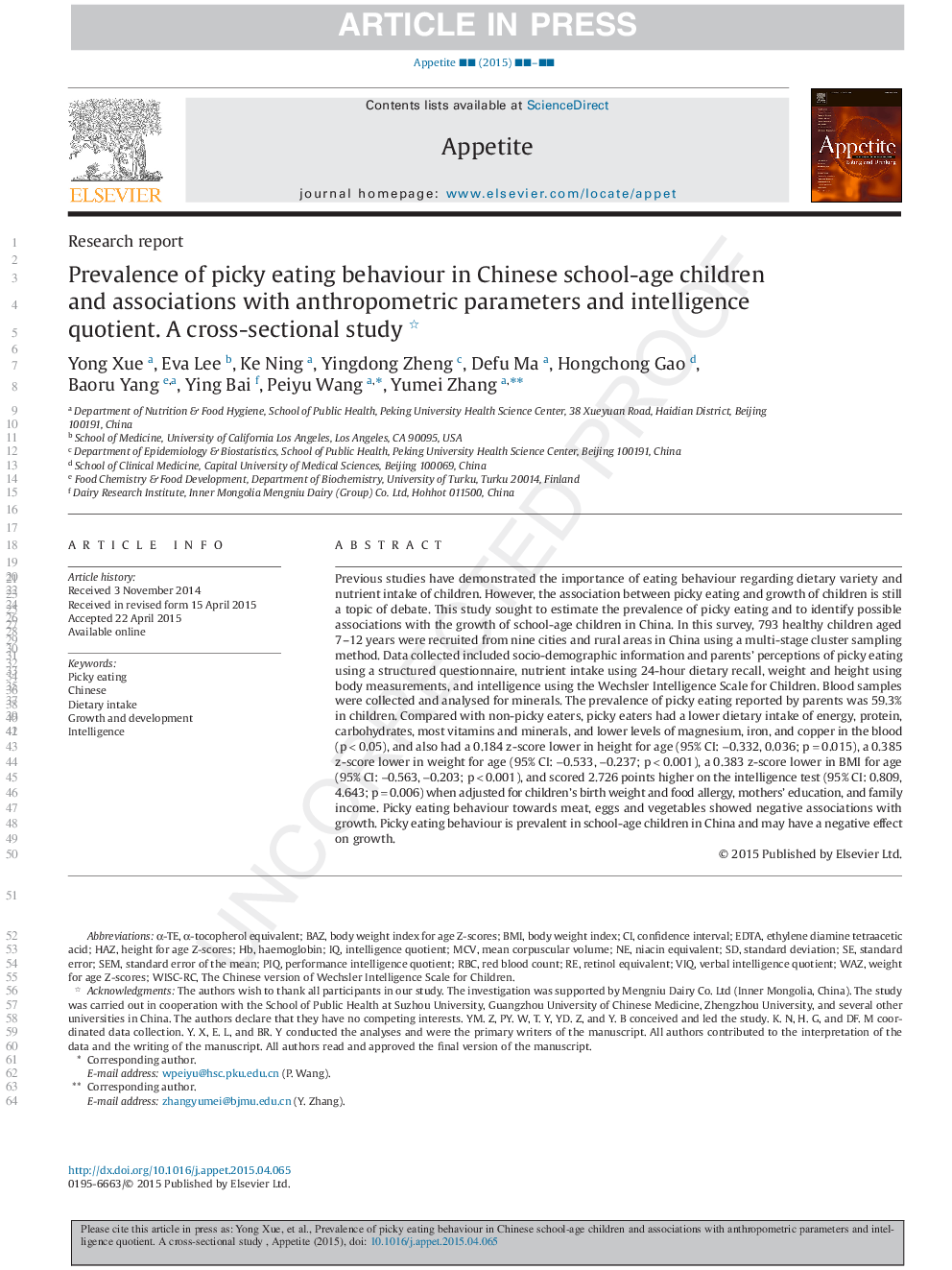| کد مقاله | کد نشریه | سال انتشار | مقاله انگلیسی | نسخه تمام متن |
|---|---|---|---|---|
| 7308750 | 1475389 | 2015 | 8 صفحه PDF | دانلود رایگان |
عنوان انگلیسی مقاله ISI
Prevalence of picky eating behaviour in Chinese school-age children and associations with anthropometric parameters and intelligence quotient. A cross-sectional study
ترجمه فارسی عنوان
شیوع رفتارهای تغذیه نامناسب در کودکان مدرسه ای چین و ارتباطات با پارامترهای تن سنجی و فاکتور هوش. یک مطالعه مقطعی
دانلود مقاله + سفارش ترجمه
دانلود مقاله ISI انگلیسی
رایگان برای ایرانیان
کلمات کلیدی
body weight indexMCVVIQBAZRBCPIQEDTA - اتیلن دی آمین تترا استیک اسید ethylene diamine tetraacetic acid - اتیلن دیامین تتراستیک اسیدHaz - انجام دهیدstandard deviation - انحراف معیارintelligence quotient - بهره هوشیMean corpuscular volume - حجم متوسط مایعstandard error - خطای استانداردstandard error of the mean - خطای استاندارد میانگینPicky eating - خوردن شیرینGrowth and development - رشد و توسعهBMI - شاخص توده بدنیconfidence interval - فاصله اطمینانverbal intelligence quotient - فاکتور اطلاعات کلامیPerformance intelligence quotient - فاکتور هوش عملکردیSEM - مدل معادلات ساختاری / میکروسکوپ الکترونی روبشیDietary intake - مصرف غذا haemoglobin - هموگلوبینIntelligence - هوشWAZ - وازChinese - چینی ها
موضوعات مرتبط
علوم زیستی و بیوفناوری
علوم کشاورزی و بیولوژیک
دانش تغذیه
چکیده انگلیسی
Previous studies have demonstrated the importance of eating behaviour regarding dietary variety and nutrient intake of children. However, the association between picky eating and growth of children is still a topic of debate. This study sought to estimate the prevalence of picky eating and to identify possible associations with the growth of school-age children in China. In this survey, 793 healthy children aged 7-12 years were recruited from nine cities and rural areas in China using a multi-stage cluster sampling method. Data collected included socio-demographic information and parents' perceptions of picky eating using a structured questionnaire, nutrient intake using 24-hour dietary recall, weight and height using body measurements, and intelligence using the Wechsler Intelligence Scale for Children. Blood samples were collected and analysed for minerals. The prevalence of picky eating reported by parents was 59.3% in children. Compared with non-picky eaters, picky eaters had a lower dietary intake of energy, protein, carbohydrates, most vitamins and minerals, and lower levels of magnesium, iron, and copper in the blood (pâ<â0.05), and also had a 0.184 z-score lower in height for age (95% CI: â0.332, 0.036; pâ=â0.015), a 0.385 z-score lower in weight for age (95% CI: â0.533, â0.237; pâ<â0.001), a 0.383 z-score lower in BMI for age (95% CI: â0.563, â0.203; pâ<â0.001), and scored 2.726 points higher on the intelligence test (95% CI: 0.809, 4.643; pâ=â0.006) when adjusted for children's birth weight and food allergy, mothers' education, and family income. Picky eating behaviour towards meat, eggs and vegetables showed negative associations with growth. Picky eating behaviour is prevalent in school-age children in China and may have a negative effect on growth.
ناشر
Database: Elsevier - ScienceDirect (ساینس دایرکت)
Journal: Appetite - Volume 91, 1 August 2015, Pages 248-255
Journal: Appetite - Volume 91, 1 August 2015, Pages 248-255
نویسندگان
Yong Xue, Eva Lee, Ke Ning, Yingdong Zheng, Defu Ma, Hongchong Gao, Baoru Yang, Ying Bai, Peiyu Wang, Yumei Zhang,
